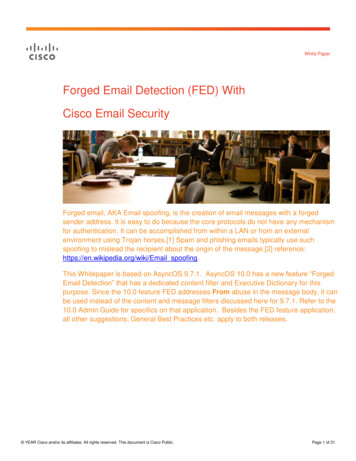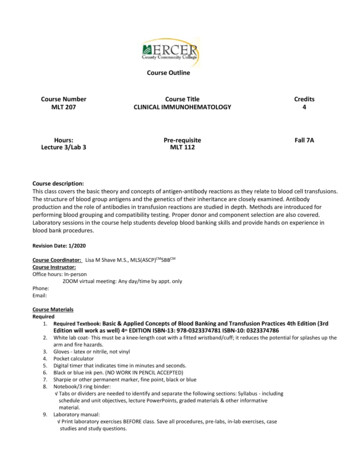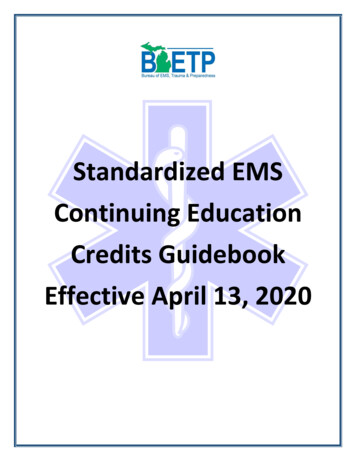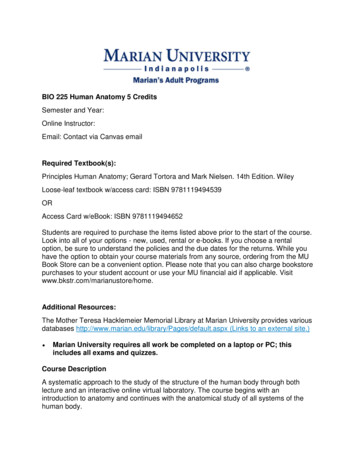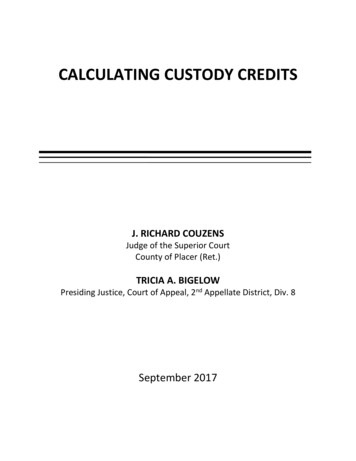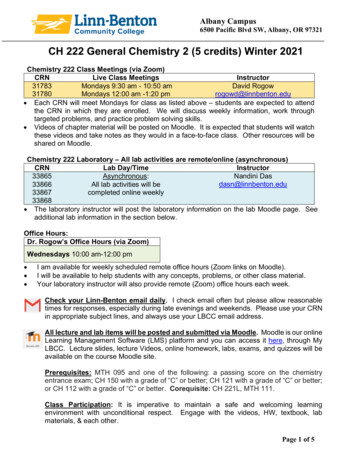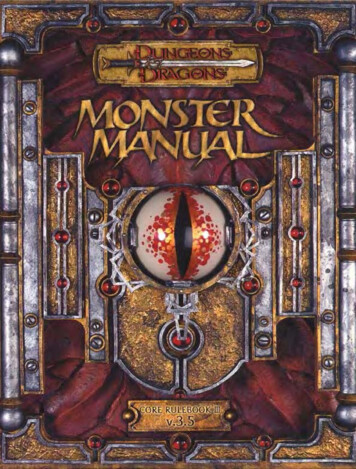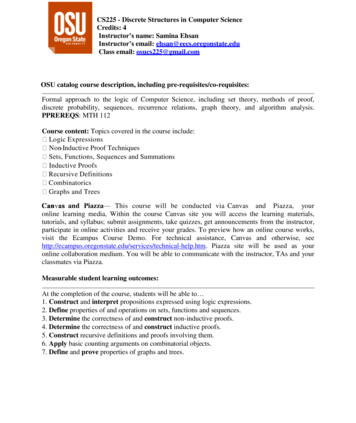
Transcription
CS225 - Discrete Structures in Computer ScienceCredits: 4Instructor’s name: Samina EhsanInstructor’s email: ehsan@eecs.oregonstate.eduClass email: osucs225@gmail.comOSU catalog course description, including pre-requisites/co-requisites:Formal approach to the logic of Computer Science, including set theory, methods of proof,discrete probability, sequences, recurrence relations, graph theory, and algorithm analysis.PPREREQS: MTH 112Course content: Topics covered in the course include:Logic ExpressionsNon-Inductive Proof TechniquesSets, Functions, Sequences and SummationsInductive ProofsRecursive DefinitionsCombinatoricsGraphs and TreesC a n vaas and Piazza— This course will be conducted via Canvas and Piazza, youronline learning media, Within the course Canvas site you will access the learning materials,tutorials, and syllabus; submit assignments, take quizzes, get announcements from the instructor,participate in online activities and receive your grades. To preview how an online course works,visit the Ecampus Course Demo. For technical assistance, Canvas and otherwise, al-help.htm. Piazza site will be used as youronline collaboration medium. You will be able to communicate with the instructor, TAs and yourclassmates via Piazza.Measurable student learning outcomes:At the completion of the course, students will be able to 1. Construct and interpret propositions expressed using logic expressions.2. Define properties of and operations on sets, functions and sequences.3. Determine the correctness of and construct non-inductive proofs.4. Determine the correctness of and construct inductive proofs.5. Construct recursive definitions and proofs involving them.6. Apply basic counting arguments on combinatorial objects.7. Define and prove properties of graphs and trees.
Course syllabus :WeekthCourse Topics ( followed the 4 edition of the required textbook )#1 Chapter 2: Section – 2.1 Logical Form and Logical EquivalenceChapter 2: Section – 2.2 Conditional Statements Chapter 3: Section -3.1 Predicates and Quantified StatementsChapter 4: Section – (4.1 to 4.4) Direct ProofChapter 4: Section – 4.6 Contraposition Chapter 4: Section – (4.6 to 4.7) ContradictionChapter 6: Section - 6.1 Set Theory Chapter 6: Section – (6.2 to 6.3) Set OperationsChapter 5: Section - 5.1 Sequences and Sums Chapter 5: Section - (5.2 to 5.3) Weak InductionChapter 5: Section - 5.4 Strong Induction#2#3#4#5
#6No quiz due tomidterm Chapter 5: (Section - 5.6 to 5.7) Recursive DefinitionsChapter 5: Section - 5.9 Structural Induction Chapter 9: Section-(9.2 and 9.3) Basic Counting RulesChapter 9: Section-9.4 The Pigeonhole Principle#7No quiz dueto midtermMidterm: (Week 1- Week 5)#8 Chapter 9: Section- (9.2 and 9.5) Permutations and CombinationsChapter 9: Section - 9.6 Permutations and Combinations withRepetition Chapter 10: Section-10.1 Basic Graph Definitions and PropertiesChapter 10: Section-10.2 Connectivity#9#10 # Final WeekChapter 10: Section -10.7 Shortest Path ProblemFinal Exam: (Week 1- Week 10)
Learning resources: Text book: Discrete Mathematics with Applications (4th Edition), Susanna S.Epp,ISBN/SKU 978-0495391326 (Required)Discrete Mathematics and Its Applications (7th Edition), Kenneth Rosen,ISBN: 0073383090 (Optional)Evaluation of student performance:Scores for quizzes, assignments, and exams will be posted on Canvas are graded. We will notuse Canvas grading scheme. If you want to know your grade, use the following weights Homework assignments 10%Quizzes 30%Midterm 30%Final 30%Homework Assignments (10%)There are homework assignments each week to be completed over the course of this class. Assignments include writing written answers to questions. There will be homeworkassignments due by the end of each week. Include a comment at the top of all of yourassignments that contains your name. Assignments should be submitted in .pdf format. You can submit scanned handwrittenanswers saved in .pdf format.Assignments are to be turned in before 23:59 on the date they are due. The lateassignment must be submitted no more than 48 hours after the original deadline. Thismeans that if an assignment is due on Oct 1 at 23:59, you may turn it in as late as Oct 3 at23:59 (with 15% penalty for each 24 hours).You will turn in your assignments through the Canvas website.If you have a problem with an assignment grade, you must contact the teaching assistant,who graded your assignment, through EMAIL within ONE WEEK of receiving yourgrade.Quizzes (30%)There will be 7 quizzes to be completed over the course of this class.
The quizzes are timed, closed-book exams. Multiple attempts of the quizzes are notallowed. Also, quizzes will not be proctored.The quizzes will be conducted via Canvas . Each quiz will be 90 - 120 minutes long.No late submission will be allowed. Please plan to take the quiz before the last dateof submission. And most importantly please don’t make any request for quizdeadline extension.When taking the quiz, you must use a text editor to write down questions involvingsymbols, equations and tables. Then upload it as a separate file in the Canvas. Ineach quiz, the last question will be just to upload your file (Please remember, answersgot lost in the past terms due to Canvas technical difficulties, so due to your ownsafety don’t forget to use the text editor and upload the file as a separate answer). Also,no hand written or scanned submissions will be allowed in the quizzes. You mustget used to with text editors before you start taking the quizzes. You can use tablets fortaking the quizzes.Exams (60% Total) There are 2 total exams for this course. The midterm is given in Week 7 and the Final in Week 11. Please check the actual datesprovided in the weekly schedule document. You will be given a 4 or 5 days long time window totake each exam. No extension will be allowed outside those assigned windows. The midterm is designed to take 110 minutes maximum. The final is designed to take 110 minutes maximum. Exam answers must be written using any text editor and uploaded (as .pdf format) toCanvas This is to secure your submission. If the exam did not get uploaded, theinstructor can do nothing. No hand written or scanned submission will be allowed in theexams. Most importantly, tablets, scanners and calculators are not allowed in the exams. The instructor must be informed once you have completed the exam**REMINDER: This course requires that you take the 2 exams under thesupervision of an approved proctor. ProctorU is an allowed option for this course. It is entirelythe student’s responsibility to secure and schedule a proctor before the exam due date and is veryimportant to submit your proctoring request as early as possible to avoid delays. Please rememberthat late exams will not be allowed due to not having scheduled a proctor early enough. Registrationfor proctored exams is available online and there is generally a small fee associated with examproctoring. For more information please visit: http://ecampus.oregonstate.edu/services/ proctoring/ . If you need assistance please contact ecampustesting@oregonstate.edu or 541-737-9281.Grading Policies:We will use the following grading structure to calculate the final grade –100 A 92.5
92 A- 89.589 B 86.586 B 82.582 B- 79.579 C 76.576 C 72.572 C- 69.569 D 66.566 D 62.562 D- 59.559 F* REMINDER: A passing grade for core classes in CS is a C or above. A C-, 72 or below, is nota passing grade for CS majors.* NOTE: Exams will be proctored, so you should schedule your exams as soon as possible.There is generally a small fee associated with exam proctoring. For more information pleasevisit: /Course Policies:Makeup Exams – Exams take a considerable effort to schedule, so they will not be given undernormal circumstances. If you learn about an event that may cause you to need to alter your examscheduling, then contact me and any proctor as soon as you can so that accommodations can beattempted.Incompletes — In this online program, there should rarely be a case where an incomplete isappropriate. I will only consider giving an incomplete grade for emergency cases such as a deathin the family, major disease, or child birth, while also having completed at least 50% of allcoursework. If you have a situation that may prevent you from completing the coursework, letme know as soon as you can.Students with Disabilities:Accommodations are collaborative efforts between students, faculty and Disability AccessServices (DAS) with accommodations approved through DAS are responsible for contacting thefaculty member in charge of the course prior to or during the first week of the term to discuss
accommodations. Students who believe they are eligible for accommodations but who have notyet obtained approval through DAS should contact DAS immediately at 541-737-4098.** Urgent: If you have any emergency medical information let me know before the end ofthe first week of classes. If you have any personal difficulties that are not registereddisabilities, then contact me so we can discuss your options.Expectations for Student Conduct:Student conduct is governed by the university’s policies, as explained in the Office of StudentConduct: information and regulations.In an academic community, students, faculty, and staff each have responsibility for maintainingan appropriate learning environment, whether online or in the classroom. Students, faculty, andstaff have the responsibility to treat each other with understanding, dignity and respect.Disruption of teaching, administration, research, and other institutional activities is prohibited byOregon Administrative Rule 576-015-0015 (1) and (2) and is subject to sanctions underuniversity policies, OSU Office of Student Conduct.Academic DishonestyThe following two policies apply:OSU policy: hpCollege of Engineering duate-policy-manual#honestyYou MAY discuss the meaning of assignments, general approaches, and strategies with otherstudents in the course.YouMAY show your work to the TAs or instructor for feedback and help.YouMAY use the Internet to research how to solve a problem.You MUST include a citation in the form of a comment in your homework to indicate thesource of any help you received (listing TAs, the instructor, or the required textbook are notnecessary).You MUST ALSO include a citation if you collaborated with any other student in any way(both the giver and receiver).YouMAY NOT share work documentation of any kind with any other student in the course.YouMAY NOT show your work to another student in the course for any reason.YouMAY NOT use or copy work from any other source, including the Internet.YouMUST write your own work for your assignments.We may use plagiarism-detection software check your work against the work from otherstudents. It is quite sophisticated and can easily see through variable name changes andformatting differences.If you are found in violation of any of the above policies, whether you are the giver or receiver ofhelp, you will receive a zero on the assignment or fail the course (Instructor's discretion). Theacademic dishonesty charge will be documented and sent to your school's dean and the Office ofStudent Conduct. The first offense results in a warning; the second offense results in an academicdishonesty charge on your transcript, a disciplinary hearing, and possible expulsion.
Conduct in this online classroom — Students are expected to conduct themselves in the course(e.g., on discussion boards, email postings) in compliance with the university's regulationsregarding civility. Students will be expected to treat all others with the same respect as theywould want afforded themselves. Disrespectful behavior to others (such as harassing behavior,personal insults, and inappropriate language) or disruptive behaviors in the course (such aspersistent and unreasonable demands for time and attention both in and out of the classroom) isunacceptable and can result in sanctions as defined by Oregon Administrative Rules Division015 Student Conduct Regulations.(Adapted from statements provided by Becky Warner, SOC)Communications:Ground Rules for Online Communication & Participation:Online threaded discussions are public messages, and all writings in this area will be viewableby the entire class or assigned group members. If you prefer that only the instructor sees yourcommunication, send it to me by email, and be sure to identify yourself and the class.Posting of personal contact information is discouraged (e.g. telephone numbers, address,personal website address).Observation of "Netiquette": All your online communications need to be composed withfairness, honesty and tact. Spelling and grammar are very important in an online course. Whatyou put into an online course reflects on your level of professionalism. Here are a couple ofreferences that discusso writing online: http://goto.intwg.com/o netiquette: ease check the Announcements area, Piazza and the course syllabus before you askgeneral course "housekeeping" questions (i.e. how do I submit assignment 3?). If you don'tsee your answer there, then please contact me.(Adapted from Jean Mandernach, PSY)Student Assistance:Guidelines for a productive and effective online classroom Piazza is your space to interact with your colleagues related to current topics orresponses to your peers’ statements. It is expected that each student will participatein a mature and respectful fashion. Participate actively in the discussions, having completed the readings and thoughtabout the issues. Pay close attention to what your classmates write in their online comments. Askclarifying questions, when appropriate. These questions are meant to probe and shednew light, not to minimize or devalue comments.
Think through and reread your comments before you post them.Assume the best of others in the class and expect the best from them.Value the diversity of the class. Recognize and value the experiences, abilities, andknowledge each person brings to class.Disagree with ideas, but do not make personal attacks. Do not demean or embarrassothers. Do not make sexist, racist, homophobic, or victim-blaming comments at all.Be open to be challenged or confronted on your ideas or prejudices.(Adapted from a statement provided by Susan Shaw, WS)Contacting the instructor — Piazza is the best way to reach the instructor and TAs for any course related query. Wecan refer back to our previous discussions here and also as it will be visible to the entireclass. So, the other students will be able to get benefit from it. Sending email (ehsan@eecs.oregonstate.edu ) is another preferred way to ask anyquestion related to the course. If needed, we can use Skype or Google Hangout fordiscussion.We will have constant TA support, so it should be possible to get help at any time. Usethe class account – osucs225@gmail.com to get support during the office hours.I will maintain virtual office hours using the same class account.Technical Assistance — If you experience computer difficulties, need help downloading abrowser or plug-in, assistance logging into the course, or if you experience any errors orproblems while in your online course, contact the OSU Help Desk for assistance. You can call(541) 737-3474, email osuhelpdesk@oregonstate.edu or visit the OSU Computer Helpdeskonline.TutoringEffective fall term 2009 we went to a new Online Tutoring Service - NetTutor to meet the needsof Ecampus students.NetTutor is a leading provider of online tutoring and learner support services fully staffed byexperienced, trained and monitored tutors. Students connect to live tutors from any computer thathas Internet access. NetTutor provides a virtual whiteboard that allows tutors and students towork on problems in a real time environment. They also have an online writing lab where tutorscritique and return essays within 24 to 48 hours.Course Evaluation:I hope to have a location in the discussion boards for evaluation of the course, where any studentwill be able to, anonymously, make comments, requests, or suggestions in regards to the designand implementation of the content of the course.
OSU Student Evaluation of Teaching — Course evaluation results are extremely important andare used to help me improve this course and the learning experience of future students. Resultsfrom the 19 multiple choice questions are tabulated anonymously and go directly to instructorsand department heads. Student comments on the open-ended questions are compiled andconfidentially forwarded to each instructor, per OSU procedures. The online Student Evaluationof Teaching form will be available toward the end of each term, and you will be sent instructionsthrough ONID. You will login to “Student Online Services” to respond to the onlinequestionnaire. The results on the form are anonymous and are not tabulated until after grades areposted.
important to submit your proctoring request as early as possible to avoid delays. Please remember that late exams will not be allowed due to not having scheduled a proctor early enough. Registration for proctored exams is available online and there is generally a sm

